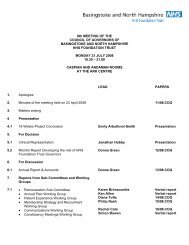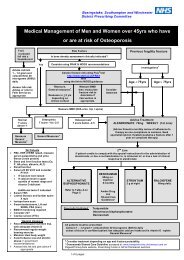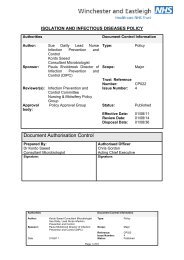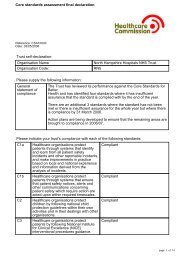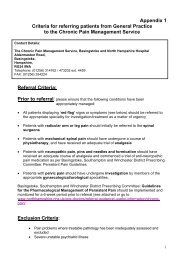InFocus Magazine 2007 - Hampshire Hospitals NHS Foundation Trust
InFocus Magazine 2007 - Hampshire Hospitals NHS Foundation Trust
InFocus Magazine 2007 - Hampshire Hospitals NHS Foundation Trust
You also want an ePaper? Increase the reach of your titles
YUMPU automatically turns print PDFs into web optimized ePapers that Google loves.
09<br />
Rachael Hartley, Occupational Therapist<br />
Working jointly with other members of the team (doctors,<br />
nurses, physiotherapists, speech and language therapists and<br />
social workers), attending meetings and case conferences.<br />
Completing projects such as audits, service development and<br />
presenting at groups (like the pulmonary rehabilitation group).<br />
Why did you decide to become an Occupational Therapist?<br />
I first discovered occupational therapy when a family member<br />
became ill and received input from an occupational therapist (OT).<br />
Seeing the positive outcomes made me interested to explore the<br />
profession further, but it was later that I realised it fulfilled all of<br />
my criteria. We help people realise functional independence and<br />
promote a better quality of life. They can work in a variety of<br />
settings including mental health the community or paediatrics.<br />
In the hospital there is the opportunity to work in a number of<br />
specialist areas depending on your interests.<br />
What does your job entail?<br />
The main aim of occupational therapy at the hospital is to<br />
provide a safe and rapid discharge. We work closely with<br />
medics, nurses, physiotherapists and social workers to achieve<br />
this. I’m called on to provide:<br />
Assessments of daily living (washing and dressing, meal<br />
preparation) and transfer assessments (getting from A to B)<br />
Cognitive assessments (assessing the functions of the brain)<br />
Wheelchair and seating assessments<br />
Assessment for and provision of equipment<br />
Assessment for minor house adaptation – rails, raising<br />
chairs/beds etc<br />
Home assessments<br />
Education and advice to family and carers about things<br />
like hoisting patients who are no longer able to transfer<br />
independently or safely.<br />
What is the best part of your job?<br />
It’s difficult to pick just one thing as there are so many aspects<br />
of the job that I enjoy! The most rewarding part of the job<br />
is contributing to an individual’s progress or achievement. It<br />
takes time but your time, patience and effort as a therapist<br />
allows many patients to achieve their goal(s). These goals might<br />
be things like walking again, being able to prepare a meal<br />
independently, or returning home safely. I also enjoy spending<br />
time with the patient to find out what difficulties they are<br />
experiencing, discuss any concerns, and try to understand how<br />
this impacts on their life. I do a lot of problem-solving, which<br />
keeps me on my feet!<br />
What is the most challenging part of your job?<br />
The most challenging part of the job is often the pace and<br />
constant demand for hospital beds which can become quite<br />
tiring! I think it’s important to have a healthy work/life balance<br />
and remember why you initially became an OT.<br />
What are your plans for the future?<br />
I want to develop my knowledge on a specific interest area of<br />
multiple sclerosis. I also hope to become accredited as a practice<br />
educator for students. Long-term, I want to take a more senior<br />
role within OT, which would involve greater responsibilities<br />
within the team, taking on a more managerial and operational<br />
role whilst continuing with a clinical caseload. OT is becoming<br />
more and more recognised and I would encourage people to<br />
consider it as a career path that can present many opportunities<br />
and be very rewarding.<br />
Occupational Therapist<br />
What is a typical day like?<br />
There is no typical day in acute medicine! I enjoy the<br />
challenge of prioritising my day, which can often change<br />
quite rapidly, so you have to remain quite flexible. Jobs<br />
on my daily schedule might include:<br />
Patient contact – completing assessments, carrying<br />
out treatment interventions, monitoring progress,<br />
providing training, information and advice and<br />
facilitating a safe discharge from hospital.




